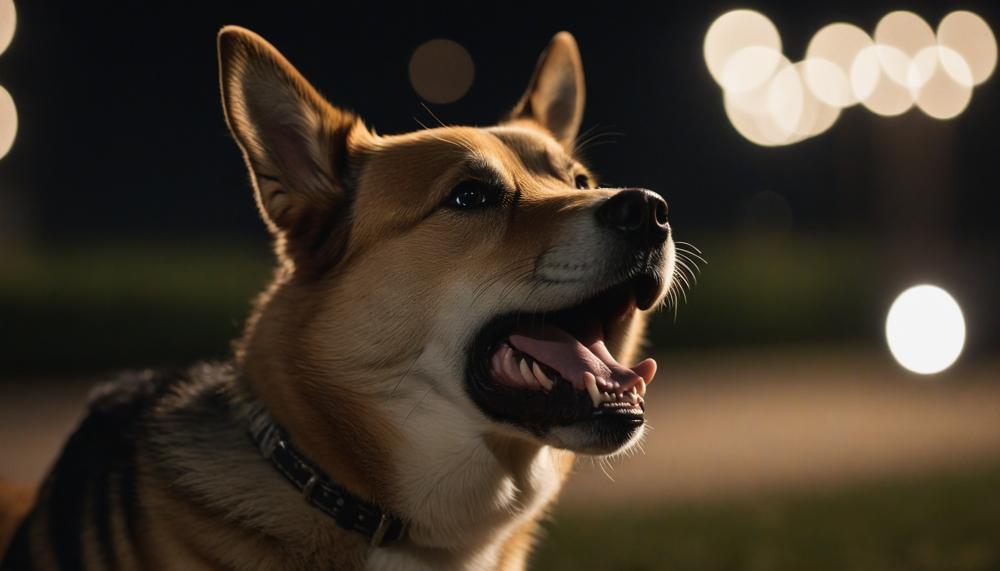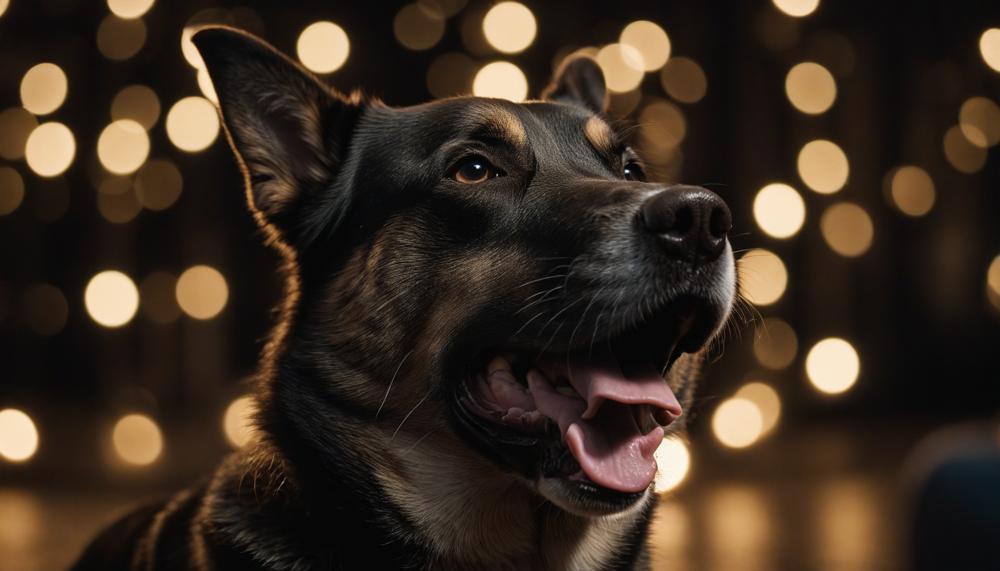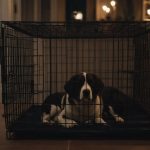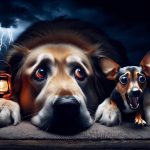Did you know that over 60% of pet owners report changes in their dog’s behavior at night? This intriguing statistic reveals how widespread nighttime disturbances involving pets can be. Among these behaviors, growling stands out as particularly concerning and perplexing for many dog owners. Why does your loyal companion suddenly start growling at you when the sun goes down? It’s a question that stirs unease and curiosity alike.
Understanding why your dog might growl at you during the night can help strengthen the bond you share, ensuring both of you get a peaceful night’s sleep. Here are some key points that will be covered to help unravel this nighttime mystery:
- Dreams and Disturbances: Like humans, dogs dream and can have bad dreams that lead them to growl in their sleep.
- Environmental Triggers: Noises that go unnoticed during the day can become significant at night, causing your dog to growl.
- Protection Mode: Dogs are naturally protective and might growl to alert you to perceived threats.
- Attention Seeking: Sometimes, a growl is simply a way to get your attention when you’re least distracted.
- Health Issues: Pain or discomfort from medical conditions like dementia or arthritis might cause growling as a response to the distress.
By exploring these aspects, we can begin to understand the complex world of our canine companions’ nighttime behaviors.
Stay tuned as we delve into the reasons behind your dog’s nocturnal growling, equipped with expert insights and practical tips to ensure harmony and safety in your home after dark.
Why does my dog growl at night?
Table of Contents
Dogs growling at night can stem from various sources, from the mundane to the serious. It’s essential to parse through the clues and understand the specific triggers. Here’s a breakdown:
Common Reasons for Nighttime Growling:
| Reason | Description |
| Bad Dreams | Dogs, much like humans, can have dreams that may cause them to growl in their sleep. |
| Strange Noises | Noises that go bump in the night can provoke a dog’s growl, as they might think there’s a threat. |
| Protective Instinct | Dogs may growl to protect their territory from strangers or perceived threats. |
| Attention Seeking | Growling might be a dog’s way of saying they need more love or care. |
| Pain or Discomfort | Medical issues can cause discomfort leading to growling as a signal of their distress. |
| Loneliness or Anxiety | If a dog feels isolated or anxious, growling can express these emotions. |
| Lack of Exercise | Excess energy can make a dog restless and more likely to growl. |
| Dementia | Older dogs may suffer from cognitive issues leading to confusion and growling. |
Strategies to Address Nighttime Growling:
- Observation: Understand what specifically triggers the growling. Does it happen at a specific time? Is there a particular noise or event?
- Comfort: Ensure your dog’s sleeping area is comfortable, quiet, and safe. This might reduce anxiety or disturbance.
- Routine: Establishing a consistent bedtime routine can help signal to your dog that it’s time to calm down and sleep.
- Exercise and Socialization: Adequate physical and mental stimulation during the day can help mitigate restlessness at night.
- Medical Check-up: If the growling is accompanied by signs of pain or discomfort, consult a vet to rule out any health issues.
- Professional Training: If the growling is aggressive or linked with behavioral issues, seeking advice from a dog behaviorist can be beneficial.
Understanding and addressing the root cause of why your dog growls at night can not only help improve your dog’s sleep but also enhance your bond with your pet, making your nights quieter and your relationship stronger.
15 reasons why your dog growls at night
Here are 15 common reasons why dogs may growl at night, along with strategies to address these behaviors effectively:
| Reason | Description | How to Address |
| Dreams | Dogs often growl in their sleep due to vivid dreams or nightmares. | Ensure they have a comfortable sleeping area to promote peaceful rest. |
| Noises | Unfamiliar sounds can startle dogs and provoke growling. | Provide a quiet sleeping environment or white noise to mask other sounds. |
| Snoring | Dogs might growl in response to snoring from family members, feeling disturbed. | Consider separate sleeping arrangements if snoring is a major disruptor. |
| Strangers | Growling at night may be an alert to the presence of strangers or intruders. | Ensure your home is securely locked and use curtains for added security. |
| Attention-seeking | Some dogs growl to get attention or communicate needs. | Establish a routine to address needs before bedtime and discourage this behavior. |
| Response to other dogs | Growling can be a reaction to hearing other dogs in the neighborhood. | Try soundproofing measures or a calming supplement to help keep them relaxed. |
| Pain | Dogs in pain may growl due to discomfort or distress. | Consult a vet for a health check-up to treat underlying health issues. |
| Trauma | Past traumatic experiences can lead to nighttime growling. | Seek professional behavioral therapy to help them cope with their trauma. |
| Loneliness | Dogs may feel isolated and growl to express this. | Keep them close to family members or consider a companion animal. |
| Frustration | Restricted movement or boredom can cause frustration growling. | Ensure they have enough space and toys to keep them occupied before bed. |
| Sleep aggression | A sleep disorder can lead dogs to growl or snap during sleep. | Avoid disturbing your dog while sleeping and consult a vet for advice. |
| Lack of exercise | Insufficient physical activity can lead to restlessness and growling at night. | Incorporate adequate exercise into their daily routine to tire them out before bed. |
| Dementia | Elderly dogs may suffer from cognitive dysfunction, causing confusion and growling. | Provide a structured routine and consult a vet for possible treatments. |
| Fear | Fear from previous experiences or general anxiety can manifest in growling. | Create a safe space and consider anxiety-reducing products and techniques. |
| Territorial behavior | Dogs may growl to protect their space or family. | Reinforce training and set clear boundaries about acceptable behavior. |
By understanding these common triggers and employing tailored strategies, dog owners can reduce or eliminate nighttime growling, fostering a more peaceful environment for both the dog and their family.

5 tips on what to do if your dog growls at night
If your dog starts growling at night, it’s a sign that they might be feeling distressed, threatened, or unwell.
Here are five practical tips to help you address this behavior safely and effectively:
| Action | Details | Benefits |
| Investigate Triggers | Identify and mitigate potential external stimuli causing distress. | Reduces anxiety by eliminating fear triggers. |
| Comfortable Environment | Optimize sleeping area for temperature, noise, and comfort. | Enhances sleep quality and reduces stress. |
| Relaxing Routine | Establish a calming pre-sleep routine. | Signals time for rest, decreasing night-time alertness. |
| Veterinary Consult | Rule out health-related causes of growling. | Ensures physical well-being and identifies medical issues. |
| Behavior Modification | Engage a professional for tailored training strategies. | Addresses the root cause of growling, improving behavior. |
Conclusion
When darkness descends and the world quiets down, it’s not uncommon for our canine companions to behave a bit differently, sometimes even growling into the night. This change can be unsettling, transforming a typically loving pet into a nightly concern. But what really triggers these mysterious growls?
The reasons are as varied as they are complex. For some dogs, the still of the night amplifies every small noise or disturbance, setting off their protective instincts or causing anxiety. Others might be responding to discomfort from health issues that become more pronounced in the quiet hours. Additionally, the deep world of dreams where dogs chase imaginary foes can sometimes manifest in vocal growls.
Managing this behavior starts with understanding the specific cause. Ensuring your dog’s sleeping environment is calm and comfortable can mitigate many common triggers. From establishing a soothing bedtime routine to consulting a veterinarian for underlying health issues, the steps are clear. Proper exercise, attention to their emotional needs, and sometimes professional behavior consultation are essential.
As the night whispers its silent tales, remember that each growl is your dog’s way of communicating.






